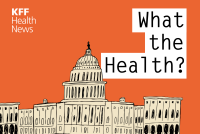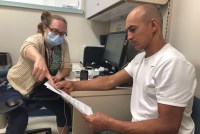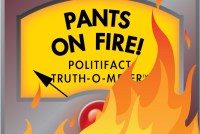Latest Morning Briefing Stories
KFF Health News' 'What the Health?': Welcome Back, Congress. Now Get to Work.
Congress returns from its summer recess with a long list of tasks and only a few work days to get them done. On top of the annual spending bills needed to keep the government operating, on the list are bills to renew the global HIV/AIDS program, PEPFAR, and the community health centers program. Meanwhile, over the recess, the Biden administration released the names of the first 10 drugs selected for the Medicare price negotiation program.
‘Like a Russian Roulette’: US Military Firefighters Grapple With Unknowns of PFAS Exposure
Federal research linking “forever chemicals” to testicular cancer confirms what U.S. military personnel long suspected. But as they seek testing for PFAS exposure, many wonder what to do with the results. There’s no medical treatment yet.
Journalists Discuss Dangerous but Little-Known Disease, Heat Deaths, and Doctor License Fees
California Healthline ethnic media editor Paula Andalo appeared on Radio Bilingüe to explain why doctors want more done to combat Chagas disease. Contributor Stephanie O’Neill Patison reported an increase in heat-related deaths and a proposal to increase doctors’ licensing fees.
Cozy Images of Plush Toys and Blankets Counter Messaging on Safe Infant Sleep
Unsafe sleep environments are among the main reasons accidental suffocation or strangulation is a hard-to-solve public health problem.
Sin mantas, peluches, ni en brazos de sus padres: cómo hacer que los bebés duerman seguros
Algunas advertencias claras: los bebés no deben dormir con mantas, peluches o protectores que puedan provocar asfixia o estrangulamiento. Tampoco en brazos de los padres.
Workers Pay the Price While Congress and Employers Debate Need for Heat Regulations
Studies suggest official numbers vastly underestimate heat-related injuries and illness on the job. To institute protections, the government must calculate their cost — and the cost of inaction.
No existen normas federales para proteger a los trabajadores cuando los días son excesivamente calurosos. Y sin el apoyo bipartidista del Congreso, incluso con la atención urgente de la administración Biden, es posible que el alivio no llegue en años.
When Temps Rise, So Do Medical Risks. Should Doctors and Nurses Talk More About Heat?
The medical dangers of heat are real. But people often ignore public heat alerts or don’t realize how vulnerable they are. A new alert system prompts clinicians to talk about heat with patients.
Activist Misuses Federal Data to Make False Claim That Covid Vaccines Killed 676,000
Anti-vaccine tech entrepreneur Steve Kirsch, whose wild assertions have been repeatedly debunked, wrongly attributes deaths following vaccination to the vaccines themselves. The Centers for Disease Control and Prevention, which runs the database, calls that inaccurate and irresponsible.
La publicación fue escrita por el activista anti-vacunas Steve Kirsch, quien ha hecho otras afirmaciones sobre las vacunas que han sido desacreditadas por PolitiFact y otros verificadores de datos.












